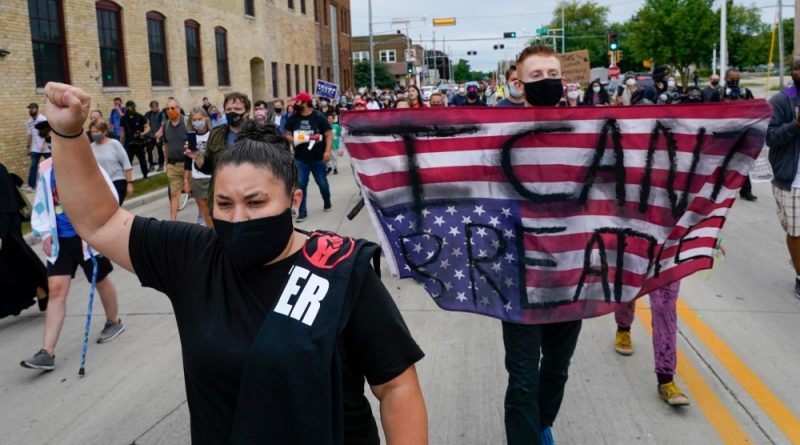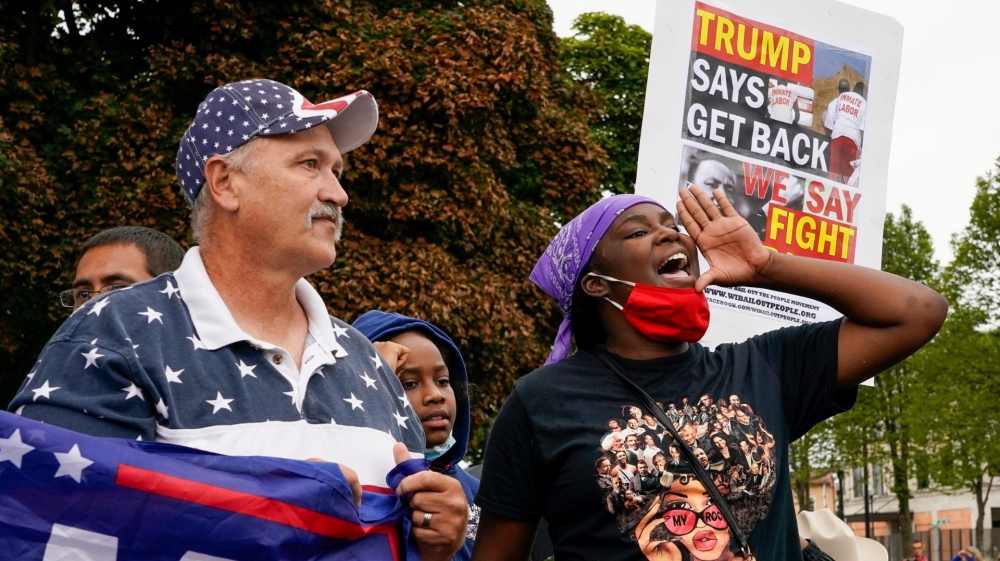Biden says Kenosha officer who shot Jacob Blake should be charged | USA News
United States presidential candidate Joe Biden has called for the officer who shot Jacob Blake to be charged as he prepares to visit Kenosha, Wisconsin.
Biden will visit the city, which has seen daily protests since the August 23 incident, on Thursday, just two days after US President Donald Trump made a controversial trip to Kenosha. That came despite requests from local and state officials that the president stay away for fear his presence would further agitate the situation.
|
Biden blasts Trump’s ‘law and order’ platform in campaign return
|
On Wednesday, Biden told reporters that the officer who shot Blake, Rusten Sheskey, “needs to be charged” while also calling for charges in the fatal police shooting of Breonna Taylor in her Louisville, Kentucky apartment in March.
“Let’s make sure justice is done,” the candidate said.
Biden said the trip is intended to help “heal” the city, where there have been daily, and at times violent, protests following the wounding of Blake, who was shot seven times in the back and reportedly paralysed as he was trying to get into a car as police US tried to arrest him. The state’s governor last week activated the National Guard to quell the unrest.
Former Vice President Biden, who has already been in contact with Blake’s family, said he planned to meet with business and civic leaders during the trip.
Diverging messages
Biden’s call for the officers to be charged represents a counterpoint to Trump’s approach to the unrest that has swept across the US during months of demonstrations calling for racial justice, initially sparked by the police-involved death of George Floyd in Minnesota in May.
During his trip to Kenosha, a city about 100,000 in the battleground state of Wisconsin, Trump visited a street where buildings had been burned by the protests before holding a round table with law enforcement. He pledged to continue to support police in the state and country and denied systemic racism was a factor in police killings of Black people.
Instead, Trump said, “bad apples” and good cops who “choke” were mostly to blame for recent high-profile incidences. The president said he continued to push a wider “law and order” message that says US cities and suburbs are under threat from “agitators”, “rioters” and “looters”.
Biden, meanwhile, has sought to underline wider security concerns in the country, fuelled by what he calls Trump’s ineptitude to deal with the coronavirus pandemic and his “fomenting” of racial discord.
Biden has also accused Trump of failing to condemn the violence committed by his supporters.
On Monday, Trump defended Kyle Rittenhouse, a 17-year-old who allegedly fatally shot two men after coming to the Kenosha protest armed with a semiautomatic rifle. In mobile phone footage recorded before the killings, the teenager, who has received significant support from some segments of the right, said he had come to Kenosha to protect property.
Trump suggested to reporters that the killings appeared to be self-defence, a view that diverges from prosecutors’ account of the events.
Playing politics
Both campaigns have accused the other of playing politics with Kenosha, with Trump acknowledging before his trip that the visit could “increase enthusiasm”.
Kenosha represents the first city that has become a hot spot of the recent race-related unrest that either candidate has visited in recent weeks. Both the president of the local NAACP chapter and the city’s mayor said earlier this week it was too early for either candidate to come to the city.
In many ways, Kenosha encapsulates the state’s voting potential for both candidates. Trump carried the county by just 238 votes in 2016, while Obama trounced his Republican opponents in the county by 18 and 12 percentage points in 2008 and 2012, respectively.
|
Trump denies systemic racism, pushes ‘law and order’ in Kenosha
|
Trump’s narrow win in Wisconsin in 2016 was fundamental to his Electoral College victory. He was the first Republican to win the state since 1984. Meanwhile, Democratic opponent Hillary Clinton’s failure to visit Wisconsin during the campaign is often cited as one of many contributing factors to her surprise loss.
While some analysts have suggested that northern battleground states like Wisconsin, with predominantly white populations, may be particularly susceptible to Trump’s tough-on-crime rhetoric, a recent Reuters/Ipsos poll showed crime remained way down on the list of Americans’ concerns, with only eight percent citing prevention as a top priority.
Meanwhile, 78 percent said they were “very” or “somewhat” concerned about the coronavirus, and 30 percent said the economy and jobs were their top priority for the country.


